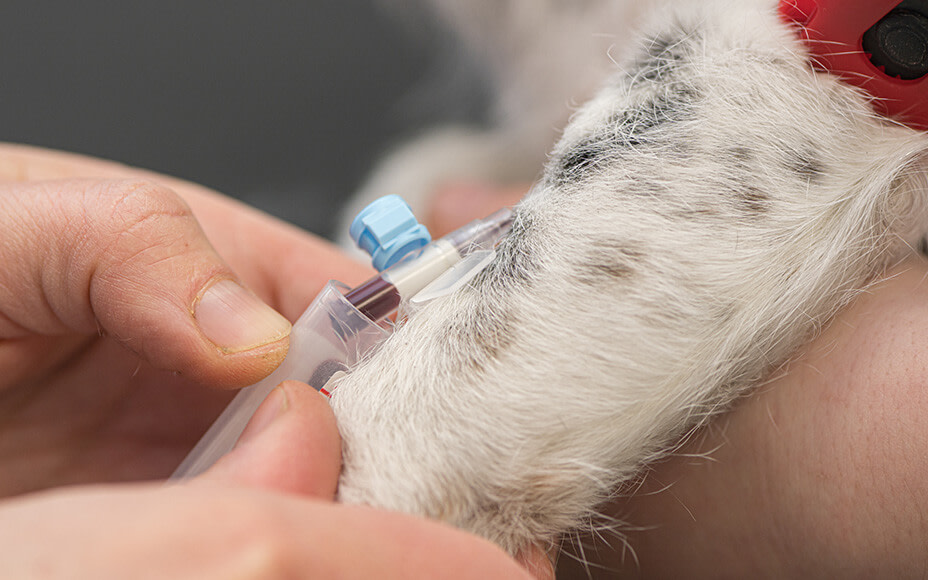Heartworms are dangerous parasites in dogs. Treatment is not straightforward, which is why prevention is crucial. Learn more!
What are heartworms in dogs?
A heartworm or heartworms (Dirofilaria immitis) are dangerous parasites that nest in the right heart chamber and the lung vessels of your dog. An adult heartworm (macrofilaria) can live up to 7 years and reach a length of 30 cm. If multiple adult heartworms accumulate in the dog, it can significantly impair the heart’s performance and the function of the lung vessels. As a result, the organs receive less oxygen. If left untreated, it can lead to kidney or liver failure and end fatally.
How does my dog get heartworms?
These parasites are more common in warm climates. Therefore, many dogs from our warm vacation countries such as Spain, Italy, Greece, Southern France, Bulgaria, Hungary, or Romania are affected. When dogs are bitten by a mosquito infected with heartworm larvae, the larvae of the heartworm enter the bloodstream. From there, they migrate into the right heart chamber and possibly later into the pulmonary artery. There, they mature into adult heartworms within 4-6 months, mate, and thus produce new larvae.
The larvae can live in a dog’s bloodstream for up to 1.5 years. If the dog is bitten again by a mosquito, they can pick up the larvae through the blood and transmit them to other animals.

Symptoms: How to recognize heartworms in your dog
Unfortunately, an infestation by heartworms becomes noticeable quite late. Because the larvae can live and grow inside your dog for a long time without being noticed. Heartworm infestation in dogs can only be detected through special veterinary examinations.
The initial symptoms usually indicate heart-lung problems such as:
- Difficulty breathing and shortness of breath
- Dry cough
- Weak, tired appearance
- Increased heart rate
- Ascites/abdominal dropsy (accumulation of fluid in the abdominal cavity)
- Fainting spells
If the disease progresses further, the liver and kidneys are also affected. Damaged organs can lead to unspecific general symptoms and some abnormalities specifically caused by liver or kidney damage. These include, among others:
- Increased urge to urinate
- Excessive thirst
- Nausea, vomiting
- Bad breath
- Anemia (low red blood cell count)
- Diarrhea
- Loss of appetite
- Weight loss
- Dull coat
- Susceptibility to infections
If you notice any of the above symptoms or if your dog exhibits other unusual behavior, promptly consult a veterinarian. Only through a medical examination can it be determined whether your beloved pet is suffering from heartworms or if there may be something else behind the symptoms.
Quick tip:
Don’t forget the tasty reward after a successfully completed examination. This way, you end every vet visit on a positive note.
How is a diagnosis made?
The further advanced a heartworm infestation is, the easier it is to detect. Depending on the stage of the disease, blood tests, X-rays, and ultrasound are performed.
An ultrasound examination is usually only performed when an advanced infestation is suspected. This is the case with dogs that already show clear symptoms of heart or lung disease and have been in an unprotected area in the past.

What is the treatment for heartworms in dogs?
In general, the earlier the disease is detected, the better the chances of a successful therapy. Ideally, treatment should take place before the parasites have caused organ damage. If your dog is proven to be infested with heartworms, treatment aims to eliminate all stages of the heartworms. Usually, medications and possibly a specific antibiotic are administered.
For a mild infestation, treatment is quite straightforward with at-home medication. In the case of a high infestation and clear symptoms, treatment often needs to be done on an inpatient basis. This is because dead heartworms can clog vessels. If there is no rapid treatment in such a case, it can end fatally. In the case of a severe infestation with adult heartworms, surgical intervention may also be advisable. This involves directly removing the parasites from the blood vessels.
How can I prevent heartworms?
In the United States heartworms are fortunately not as widespread. However, there is a high risk of infection if you want to take your dog on vacation and it is a risk area. Therefore, the safest preventive measure would be to leave the dog at home.
But there are also various products against mosquitoes for dogs. These include special parasite collars or spot-on preparations. Regular preventive deworming can also reduce the risk of infection. Also, try to avoid being outdoors with your dog at dusk, as this is when mosquitoes go foraging and are particularly active.
If you have been on vacation with your dog and have not protected him from mosquitoes, you should have a blood test for heartworm larvae performed 6 months after your vacation. Before that, the life cycle of the worms is not yet complete, which could lead to a false negative result.


